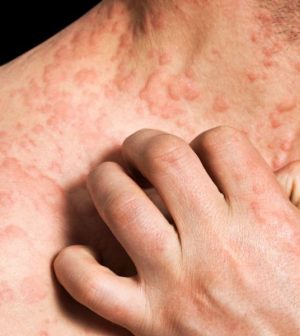- Could Your Grocery Store Meat Be Causing Recurring UTIs?
- Are You Making This Expensive Thermostat Error This Winter?
- Recognizing the Signs of Hypothyroidism
- 10 Strategies to Overcome Insomnia
- Could Artificial Sweeteners Be Aging the Brain Faster?
- Techniques for Soothing Your Nervous System
- Does the Water in Your House Smell Funny? Here’s Why
- Can a Daily Dose of Apple Cider Vinegar Actually Aid Weight Loss?
- 6 Health Beverages That Can Actually Spike Your Blood Sugar
- Treatment Options for Social Anxiety Disorder
Eczema Can Take a Toll on Adults

The itchy, rashy skin condition eczema sometimes takes a heavier toll on adults than children, an expert says.
“Adult eczema patients may have dealt with their symptoms for their entire lives, which can be draining, or they may experience symptoms for the first time as adults, which can be a difficult adjustment,” said Dr. Jonathan Silverberg, an assistant professor at Northwestern University Feinberg School of Medicine in Chicago.
“Either way, this condition can take a real toll on them,” added Silverberg, director of Northwestern’s Multidisciplinary Eczema Center.
Some people mistakenly regard eczema as a childhood disease and not a serious health problem for adults, he said.
“People who aren’t familiar with the disease might say, ‘It’s just eczema.’ But for many patients, it’s not ‘just eczema.’ It can be debilitating,” Silverberg said in a news release from the American Academy of Dermatology.
The intense itching and dry, red patches of skin can make daily tasks and physical activities difficult, he said. Some evidence suggests it leads to poorer job performance, disrupts sleep, and contributes to mental health problems such as anxiety and depression, he explained.
Also, someone with visible eczema may feel social stigma if others incorrectly believe the disease is contagious or associated with poor hygiene, Silverberg said.
“Fortunately for patients, treatment can help alleviate the negative effects of this disease and improve their physical and mental well-being,” he added.
Treatment regimens include topical steroids, moisturizers, phototherapy or systemic medications. Also, the U.S. Food and Drug Administration recently approved two new eczema treatments: an anti-inflammatory topical medication for mild to moderate conditions and an injectable drug for tougher cases, according to Silverberg.
More information
The American Academy of Family Physicians has more on eczema.
Source: HealthDay
Copyright © 2026 HealthDay. All rights reserved.










